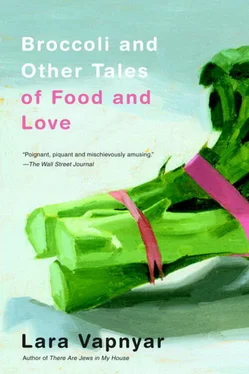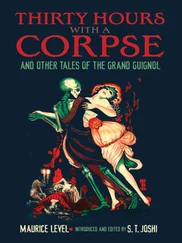Lara Vapnyar
Broccoli and Other Tales of Food and Love
A Bunch of Broccoli on the Third Shelf
A NOTHER ONE, seduced and abandoned,” Nina’s husband said, pulling a bunch of wilted broccoli from the refrigerator shelf. He held it with two fingers as if it stank, his handsome face scrunched in a grimace of disgust.
It doesn’t stink, Nina thought. She blushed and hurried to take the broccoli — to throw it into the garbage. It isn’t fresh, but you can’t say that it stinks. She didn’t say these thoughts aloud. She said she was sorry, she was busy all week and didn’t have time for cooking. Nina worked in Manhattan. By the time she came home to Brooklyn, it was already seven thirty, sometimes eight, and she felt too tired to cook. The most she could do was fix a sandwich for her husband and herself or boil some meat dumplings from a Russian food store.
“Yes, I know,” her husband said. “But why buy all these vegetables if you know you won’t have time to cook them?” Nina shrugged. She liked shopping for vegetables.
Nina couldn’t say when she’d first begun the habit of shopping for vegetables. Probably two years earlier, on her second day in America, when she and her husband left her sister’s Brooklyn apartment to explore the nearest shopping street. Her sister, who’d lived in America for fourteen years, called herself an American. She thought Nina would be impatient to see everything. “Go, go,” her sister said. “But don’t buy anything. To survive in America, there are two rules you have to remember. First: Never buy anything in expensive stores unless they have a fifty-percent-off sale. Second: Never ever buy anything in cheap stores.”
On the street with the unimaginative name Avenue M, they walked through narrow stores that all looked alike to Nina, no matter what they sold: food, electronics, clothes, or hardware. After a while, it seemed that they were walking in and out of the same store over and over, just to hear the chime of its bell. The February morning was cold, and the sunlight was pale. Nina hid her reddened nose in the fur collar of her Russian coat. She clutched her husband’s elbow and carefully stepped over piles of garbage, reluctant to look up or sideways at the ashen sky or the motley signs of the shops. She felt dizzy and a little nauseated from the flight and the all-night talk with her sister. Only one place attracted her attention: a small Korean grocery with fruits and vegetables set outside on plywood stands — colorful piles of oranges, tomatoes, and cucumbers, almost unnaturally clean and bright. Nina read the sign on the box of tomatoes: SUNRIPE. She was still learning English, and every new expression seemed exciting and full of great meaning. SUNRIPE brought to mind a vegetable patch on a summer afternoon, the smell of the rich soil heated by the sun, pale-green branches sagging under heavy tomatoes bursting with juice. SUNRIPE reminded her of her family’s tiny vegetable garden when she was little. Nina wanted to touch the tomatoes in the box, hoping that their surface would still be a little warm from all the sun that shined on them while they ripened. She was reaching for one when her husband dragged her away to another store.
Now Nina shopped alone for vegetables every Saturday morning while her husband slept late. Nina drove to 86th Street to visit the Korean and Russian vegetables stores between 22nd and 23rd avenues. The assortment in the stores was generally the same, but Nina liked to explore each of them, hoping to find something surprising, such as the occasional white asparagus, or plastic baskets of gooseberries, or tiny nutlike new potatoes. On days when there weren’t any new or exciting items, it was still interesting to compare the stores. In one store the onions could be large and shiny, but the bunches of lettuce wilted and colorless. Another store could boast of the freshest, brightest lettuce, while the squashy gray onions hid timidly in string bags.
Nina felt a thrill as soon as she climbed out of the car by a store entrance, her feet touching a sidewalk littered with bits of lettuce, onion peel, and broken tomatoes. Inside, she walked between the produce shelves, touching the fruit and vegetables and marveling at how different their surfaces felt. She ran her fingers over the tomatoes; they felt smooth and glossy like polished furniture. She cupped oranges, feeling their lumpy skins in her palms. Sometimes she would hook an orange peel with her nail so it would sputter a little of its pungent, spicy juice on her finger. She avoided the hairy egg-shaped kiwis and wormlike string beans. She liked to stroke the light, feathery bunches of dill and parsley, and to squeeze artichokes, which felt like pine cones, but soft ones. She liked to pat cantaloupes and tap watermelons with her index finger to hear the hollow sound they made. Most of all, Nina loved broccoli. It smelled of young spring grass, and it looked like a spring tree with its solid stem and luxuriant crown of tight grainy florets that resembled recently blossomed leaves.
Regardless of the other vegetables she bought, Nina took home a bunch of broccoli every week. She carried the heavy brown bags proudly to the car with the firm belief that this weekend she would find time to cook. There was the rest of Saturday afternoon ahead, and all of Sunday. She would wash the vegetables as soon as she got home and then cook something on Sunday, maybe spinach gnocchi, or grilled zucchini, or broccoli topped with a three-cheese sauce.
Somehow, Nina invariably managed to forget both the errands she had to run on Sundays and the Saturday-night parties at her husband’s friend’s. As soon as she came home, Nina immediately found herself in a whirl of things to do. She had to shower in a hurry, hot-curl her hair, brush it down if it turned out too frizzy, try on and reject various sweaters and pants, put on her makeup, find her husband’s socks, iron his shirt, tell him where his other sock was, check if the gas was off, and lock the door.
In what seemed like only a minute, Nina found herself back in the car on the way to the party. She alternately glanced at her husband in the driver’s seat and at her reflection in the mirror. Her husband seemed distant and deep in his thoughts, which was natural, she told herself, because he was driving. And her own reflection seemed unsatisfying. Her hair was still too frizzy, her soft-featured round face required a different type of makeup, and her blue angora pullover cut into her armpits. The thing about clothes bought at fifty-percent-off sales was that they were either the wrong size or the wrong design. In the car, Nina didn’t think about vegetables. They lay abandoned on the refrigerator shelves, where Nina had shoved them in a hurry: tomatoes squashed under zucchini, lettuce leaves jammed against the edge of the vegetable basket, a bunch of broccoli that didn’t fit anywhere else placed all by itself on the third shelf.
The parties were held at Pavlik’s place, Nina’s husband’s friend from work, whose wife had divorced him a few years earlier. Pavlik was a heavy man with an uneven ginger-colored beard. He wore ill-fitting trousers and unclean shirts. He loved to laugh heartily and smack his friends on the back. “Don’t mind the mess!” he yelled, as his guests wandered through the dusty labyrinth of his house, stumbling on mismatched furniture, broken electronic equipment, heavy volumes of Russian books, and slippery magazines. It seemed to Nina that Pavlik’s function as a host was limited to yelling, “Don’t mind the mess!” He didn’t feed or entertain his guests. People came to him with their own food and wine, their own plastic dinnerware, their own guitars, and sometimes their own poems written in notebooks.
Читать дальше












